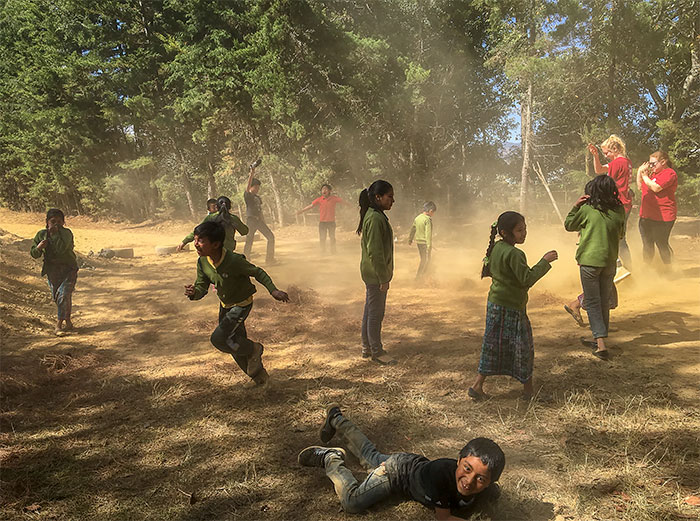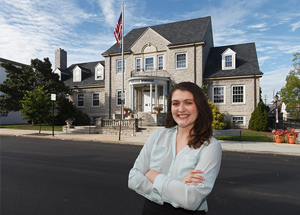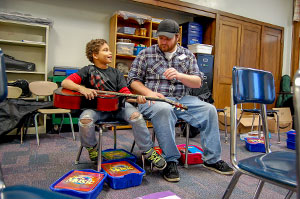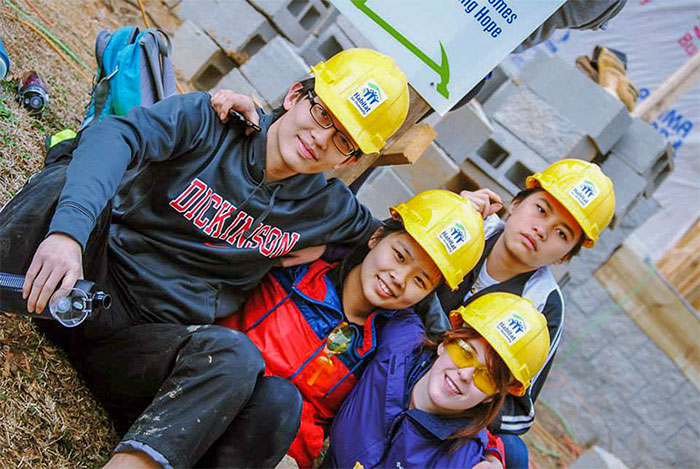In Service

“We’re going to be known as the place that is solving the problems not just in the U.S., but those big ones that we all face around the world.” –President Margee Ensign
Founding Father Benjamin Rush marched alongside the American army, signed the Declaration of Independence, served as a physician to the Philadelphia community and maintained his position among the progressive political and intellectual minds of the budding nation. He was a revolutionary in the midst of a revolution. He founded Dickinson College to offer students a useful education grounded in a strong sense of civic duty. Today, his mission lives on. In fact, Dickinson has remained a pioneer in civic learning and community engagement ever since, and under President Margee Ensign’s leadership, we are propelled with renewed energy to lead the way.
Dickinson’s vision is one of students, faculty, staff and alumni who are deliberate about creatively, ethically and productively engaging themselves and their institution in the work of the local and the global community. Dickinson is a living laboratory, and we pride ourselves on civic learning in the classroom, which helps inform hands-on learning in various communities.
Ensign has already tried and tested university-based community engagement firsthand at the American University of Nigeria. Coming to Dickinson, she brought that experience into a community with a long-standing commitment to service and ignited a synergy that fueled more than 30,000 hours of service in the past year and saw the launch of the Presidential Commission on Community and Civic Learning & Engagement. This feature includes a sampling of how some of those hours were spent and of how the Dickinson community engages the world.
—Alexander Bossakov ’20
- Dickinson became the first liberal-arts college to join the Engagement Scholarship Consortium, an international association advancing the role of community-engaged scholarship in higher education.
- The Andrew W. Mellon Foundation awarded Dickinson $650,000 to launch a four-year initiative to enhance civic learning and engagement on campus and in the global community, including the addition of a faculty position that will engage faculty and staff to infuse practical ethics and ethical reasoning across curricular and extracurricular activities.
- More than 450 volunteers from Dickinson and the United Way completed 48 service projects throughout the local community as part of the Day of Caring on October 6, 2017.
- Dickinson is home to one of the nation’s leaders in citizen science—the Alliance for Aquatic Resource Monitoring (ALLARM). For more than 30 years, ALLARM has been empowering volunteers to conduct research on streams and connecting students with meaningful educational opportunities.
- Since 1996, 400 Dickinson students and 46 faculty members have engaged in more than 25 Mosaics, intensive, interdisciplinary, semesterlong research programs designed around ethnographic fieldwork and immersion in domestic and global communities. Mosaics like “Responding to Disasters in the U.S. and Japan” and “From Kyoto to Copenhagen: Negotiating the Future of the Planet” intertwine the college’s foundational pillars—global, sustainable, engaged—to explore and contribute to the greater good.
Dickinson-Carlisle Scholarship
launched in 2017, offering a full-tuition “engaged citizenship” scholarship to a Carlisle resident.
The Dickinson College Student Ambassador to Borough Council position was created in 2002 to strengthen the relationship between Carlisle and Dickinson and connect civic-minded students with the local community. “Since the borough is so integrated in our community, it’s important for students to know that we don’t live in a bubble.” –Jackie Joyce ’19, 2016-17 student-ambassador
students participated faculty and staff participated trips to Philadelphia, Pittsburgh, Detroit, Florida, Georgia, West Virginia, Guatemala, Washington, D.C., and the Navajo NationService Trips (2016-17)
104
17
9
Community-Based Research and Service Learning Courses
Service learning grows out of a collaborative relationship between a Dickinson faculty member and a community organization. Professors align the learning objectives of their courses with the needs of the partnering organization, so that both students and the community benefit from the relationship.
Sampling of Courses:
- Environmental Studies 280: Environmental and Social Justice
- Psychology 475: Seminar in Community Psychology
- Theatre & Dance 214: Community Engagement and Artistic Activism
- Policy Management 401: Policy Management Seminar
- Spanish 239: Spanish for the Health Professions
More than 50 current faculty members include at least one community-based service learning or research course in their teaching portfolios.
“I learn over and over again how compassionate and selfless and motivated students are to reach out and help others while being mindful of privilege, of trying to save others, of doing what is needed and not just what we feel good doing.” –Donna Hughes, Director of the Center for Service, Spirituality & Social Justice
The CommServ branch of Dickinson’s Center for Service, Spirituality & Social Justice is a network of 15 programs that builds and maintains strong partnerships in the local community. Here’s a sampling: Montgomery Service Leaders – students engage in long-term work with community partners, promoting in-depth service and academic connections in a framework for student leadership development Justice Served – focuses on the intersection of community service and social justice (e.g., LGBTQ youth homelessness, Hunger Banquet)
In the Community
“We want to see our students actively engage the world ‘beyond the limestone walls’ through critical engagement with the civic concerns in their fields of study, research or other forms of civic action or engagement” –Shalom Staub, Associate Provost of Academic Affairs and
Civic Engagement
In the Wider World
- Long Way Home, Guatemala
Constructing self-sufficient schools that promote education, employment and environmental stewardship using sustainable design and materials - Repair the World, Detroit and Flint, Michigan
Engaging in social justice, advocacy and education volunteering and workshops - Community Collaborations International, Florida
Creating an oyster reef and other ecosystem-restoration efforts on the Gulf Coast

“Service certainly makes me more intentional and more critical of things. It’s a lens I take especially when I’m on service trips. I think it is very easy to over-glorify it all, but really it’s an exchange that you have with another culture. When I was in Laos, there was a lot I took away and a lot that I left there.” –Lea Zikmund ’18
Read more from the spring 2018 issue of Dickinson Magazine.
TAKE THE NEXT STEPS
Published April 18, 2018